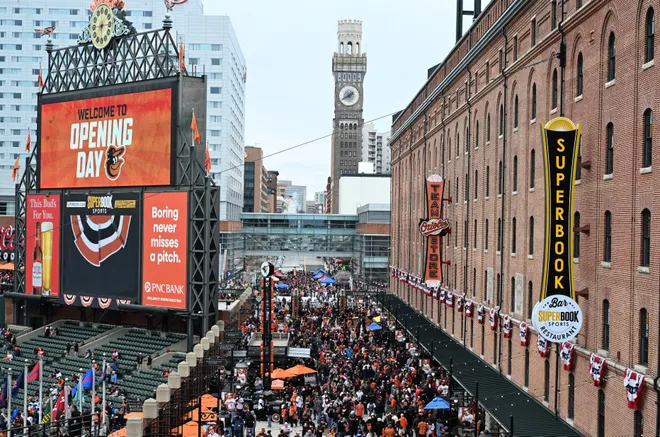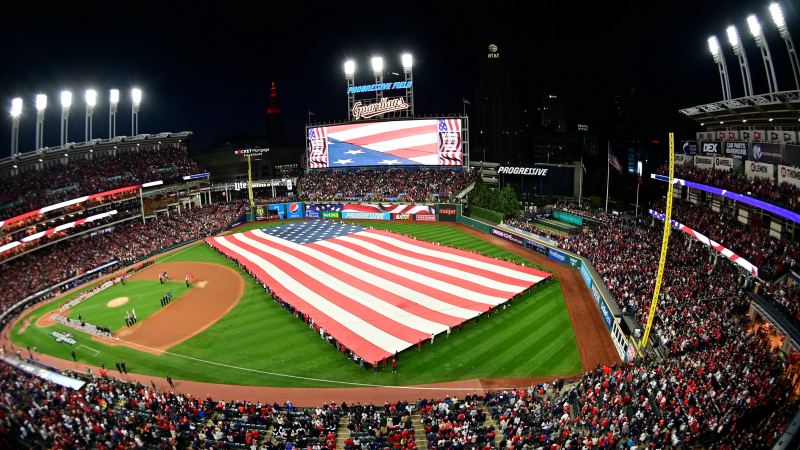Opening Day like no other: Orioles welcome new owner, chase World Series as tragedy envelops Baltimore
BALTIMORE – The emotions of a baseball season are supposed to unfold over 162 games. Yet at an Opening Day like no other in Baltimore Orioles history, the highs and lows and the contrasts within provided months worth of spiritual punch on a single Thursday afternoon.
It was part pep rally: A glorious occasion for new Orioles owner David Rubenstein and his partners, whose $1.725 billion purchase of the club was approved just a day earlier by Major League Baseball and feted in a press conference complete with applause lines and the reintroduction of the legendary Cal Ripken Jr., back in the fold as a part owner.
It was part great expectations, so standard on this secular holiday but moreso at Camden Yards: These Orioles won 101 games last season, and with the import of Game 1 starter Corbin Burnes, World Series hopes have returned for the first time in at least a decade.
But no party could ignore the biggest emotional tug, less than 10 miles away, where Tuesday’s collapse of the Francis Scott Key Bridge claimed the lives of six workers, paralyzed a significant portion of the city’s economic engine and served as a sobering testament for the limits of infrastructure within the global economy.
Before the Orioles took on the Los Angeles Angels, a moment of silence hushed the Camden Park crowd.
MLB SALARIES: Baseball's top 25 highest-paid players in 2024
The man-made disaster was why Rubenstein’s introduction to Orioles fans counted not just franchise luminaries and limited partners among its attendees, but also Baltimore mayor Brandon Scott and Maryland Gov. Wes Moore, who have spent much of the past 48 hours at the edge of the Patapsco River, getting debriefed and plotting paths forward for a city and state.
Thursday, NTSB updates gave way to Major League Baseball for the state’s top officials, and that bizarre confluence will at least partly frame an Orioles campaign whose primary and realistic goal is the first World Series championship since 1983.
“This team is about the city. The Orioles are the soul of Baltimore,” says Moore.
“And the city is going to need you now more than ever.”
The crash of the Dalia tanker into the Key Bridge, its subsequent collapse and closure of Baltimore’s port is costing the city an estimated $10 million per day in economic activity, and Moore said Thursday that 8,000 workers need economic relief.
The juxtaposition of a billion-dollar transaction amid this economic paralysis was lost on no one.

'I will be buried here'
Moore was sworn in as Maryland governor in January 2024, and the state’s lone major league ballclub has always lingered on his radar. One year ago, Moore and then-owner John Angelos took a trip to Atlanta, the latest ownership contingent to tour the Battery, a mixed-use development that Angelos had designs on replicating in Baltimore.
Those dreams kept Angelos from signing a 30-year lease that assured the Orioles’ future in Baltimore. Yet as his dreams of Battery North faded, the Orioles signed the lease before the Dec. 31 deadline to access $600 million in renovation money from the Maryland Sports Authority.
He also decided to sell the team.
Enter Rubenstein, 74, whose roots were a theme throughout Thursday’s introduction: The son of public school teachers, a product of Baltimore City College, a regular dude who happened to co-found the Carlyle Group, a private-equity firm that helped him amass a net wealth approaching $4 billion.
To Baltimoreans tired of the Angelos family’s haphazard ownership – family scion Peter Angelos passed away Saturday at 94 – Rubenstein, despite his significant wealth, could plausibly say he was one of them.
“My parents are buried here,” he said Thursday. “And I will be buried here.”
Rubenstein, a noted philanthropist and former Kennedy Center chairman, exuded a relatability beyond the standard magnate-owns-team, exhibiting a dry wit and unheistance to surprisingly summon folks like Orioles GM Mike Elias to the dais.
He even riffed a bit on his mammoth acquisition of wealth in discussing the first time he met Moore, who went from Rhodes Scholar to war veteran to governor of Maryland.
“We tried to recruit him for my firm,” says Rubenstein. “I told him the highest calling in life is private equity.
“He had other things in mind.”
Rubenstein certainly had a better week than protégé and fellow Carlyle alum Glenn Youngkin, the Virginia governor whose gambit to move the Washington Capitals and Wizards across the Potomac River was rebuffed this week.
Rubenstein’s franchise was hurriedly and unanimously approved by MLB owners, less than two months after striking an agreement to sign the team.
The timing was certainly right.
“I want to make sure this is not the high-water mark,” says Rubenstein. “I want the high-water mark to be in the fall, when we go to the World Series and we are a city that supports a great team – and we have unified the city in a way only the Orioles can do.
“Nothing unifies this city as the Baltimore Orioles.”
Their task got just a bit heavier this week.

'That's why we're here'
You could hear it in Orioles manager Brandon Hyde’s voice. Usually a rock at the mic, Hyde began his first pregame briefing of the year reading a statement sending condolences to the families impacted by the collapse.
And when someone recounted that Rubenstein called Hyde the greatest manager in baseball, the sixth-year manager and reigning AL Manager of the Year found his voice choking a bit.
“Well, that’s really nice of him to say,” says Hyde. “My interactions with him have been incredible. He is obviously really smart, he’s extremely funny and witty and such a pleasure to talk to and really interested, curious and I’ve walked away every single time thinking, ‘This guy is unbelievable.’”
Veteran outfielder Austin Hays called Rubenstein “a very impressive man” and “a Baltimorean through and through,” and his purchase marks perhaps the final step in a process for Hays and fellow outfielders Anthony Santander and Cedric Mullins, parts of three 100-loss teams and with Hyde from the jump.
“I’ve seen a lot of turnover, a lot of change. I’m hoping the guys you’re looking around the locker room – it’s a good core here – don’t change that much.
“I hope we’re playing together for a long time.”
It’s now incumbent on Rubenstein to keep the core together, to aggressively court young stars Gunnar Henderson and Adley Rutschman into long-term homes here, to add free agents that the Angelos family has been loathe to invest in for the past seven or so years.
Already, Ripken is fully back in the fold, after spending many of the past years at some stage of remove from the club. “The timing feels good,” he said, referring to how the business acumen he developed the past two decades should help him in his new appointment.
But the subtext was clear: He’s joining an ownership group that seems embraceable, that will honor the past and (though the jury is out) lock down their future.
Since Tuesday, the area took on a greater concern, and an Orioles season of great expectations was reframed. The wins and losses and walk-offs and gut punches will provide their own roller coaster.
The greater subtext will provide another.
“Those of us involved in sports live and die and breath it day in and day out and fans and communities feel the same way,” says Hyde. “To have a special team that the city can rally around and for us to uplift people also, in times that are tough, when people do need lift, giving them some sort of enjoyment in hard times, that’s why we’re here.
“And that’s important.”
Disclaimer: The copyright of this article belongs to the original author. Reposting this article is solely for the purpose of information dissemination and does not constitute any investment advice. If there is any infringement, please contact us immediately. We will make corrections or deletions as necessary. Thank you.







